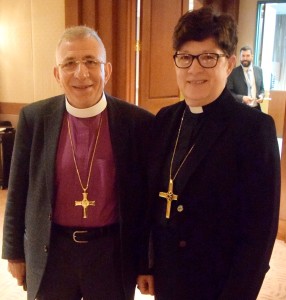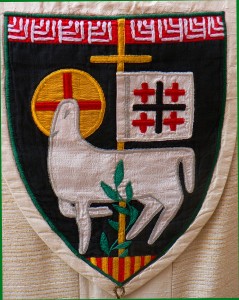On August 6, 2019, at the ELCA’s 2019 Churchwide Assembly in Milwaukee, the assembly approved by 96% (YES-829; NO-33) four Assembly Actions related to Israel and Palestine (the memorials were presented en bloc with other memorials). The Assembly Actions deal with the human rights social investment screen, the detention of Palestinian children by Israel, funding for Augusta Victoria Hospital, and continuing to listen to various perspectives on the conflict. The Assembly Actions include urgent requests for advocacy related to the Lutheran World Federation’s Augusta Victoria Hospital and the military detention of Palestinian children by Israel. The Peace Not Walls team will continue to provide resources for education and advocacy related to both.
The Assembly Action titled “Category B1: Just Peace” “commend[s] and encourage[s] Portico Benefit Services to continue its implementation of the human rights social criteria investment screen as it relates to investments in Israel and Palestine.” This relates to the Churchwide Assembly Action in 2016 which directed “the ELCA’s Corporate Social Responsibility review team to develop a human rights social criteria investment screen based on the social teachings of this church and, in the case of Israel and Palestine, specifically based on the concerns raised in the ELCA Middle East Strategy; …” [CA16.06.31].
The Assembly Action acknowledges the Human Rights social message that was adopted in November 2017 and the ELCA Human Rights screen that was approved by the Portico Benefit Services’ board of trustees in August 2018. The screen states, “The ELCA recommends not investing in corporations benefiting from the most egregious denial of the rights of humans as political and civic beings to have equal access and participation in legal and political decisions affecting them.” Implementation of the screen for Social Purpose investment portfolios began in April 2019.
The Assembly Action titled “Category B2: Palestine (No Way to Treat a Child)” urges the ELCA to advocate to “ensure that U.S. taxpayer funds not support military detention, interrogation, abuse or ill-treatment of Palestinian children” and create resources so congregations can “learn more about the lives of Palestinian children and how Israel is spending U.S. military assistance to detain Palestinian children.”
In the Israeli-controlled occupied Palestinian territories (East Jerusalem and the West Bank), Israeli security forces utilize a military detention system to address alleged violations of the military law it has imposed. Nearly half of the Palestinian population in the West Bank is under the age of 18, but no distinction is made in how children are treated despite Israel being a state party to the United Nations Convention on the Rights of the Child.
Human Rights Watch and B’Tselem have documented evidence of how children are treated; for example, being hand-tied, blindfolded, removed from their homes in the middle of the night, abused verbally, intimidated and/or forced to sign statements in Hebrew (of which few have knowledge), etc.
Further background information and resources will be provided by Peace Not Walls in the coming months.
The Assembly Action titled “Category B3: Augusta Victoria Hospital” requests the ELCA to advocate for “all relevant legislators to release FY2018 funding intended by Congress to support the East Jerusalem hospitals in FY2018, and continue funding at previous levels until the Israeli/Palestinian conflict is resolved.” It also requests the ELCA to advocate for the “applicable legislators to restore FY 2018 funding to the United Nations Relief and Works Agency for Palestine Refugees in the Near East (UNRWA) and beyond, and continue funding at previous levels until the Israeli/Palestinian conflict is resolved.”
Augusta Victoria Hospital (AVH), owned and operated by the Lutheran World Federation (LWF), is a center of medical excellence in East Jerusalem, serving the five million Palestinians in the West Bank and Gaza. As one of the six hospitals in the East Jerusalem Hospitals Network, AVH offers specialized care not available in other hospitals in the West Bank and Gaza, including radiation therapy for cancer patients and pediatric hemodialysis.
In the last decade the U.S. government, through the U.S. Agency for International Development (USAID), invested nearly $10 million in AVH to bolster its capacity as a cancer center. In addition, the U.S. government provided, over several years, tens of millions of dollars in aid to help cover the costs of the cancer patients and others referred to AVH and the other East Jerusalem hospitals by the Palestinian Authority.
AVH and the five other East Jerusalem hospitals rely on funding each year from the U.S. and the European Union (EU) to cover approximately half of the costs of patients referred to these hospitals by the Palestinian Authority. The U.S. Congress approved USD 25 million for the financial years 2017 and 2018 to be paid to the PA to help cover the bills of the West Bank and Gaza patients that are treated in the East Jerusalem hospitals.
In 2018, the Administration cut the FY 2017 funding to the East Jerusalem hospitals, making it all the more urgent in the short-term to encourage the Administration to release the FY 2018 funding. Further background information can be found here. Take action today by sending a letter to your members of Congress using our sample letter found here.
The Assembly Action titled “Category B4: Engagement in the Holy Land” reaffirmed “that the ELCA, in its various expressions, continue to listen to the voices of persons holding various perspectives on the Israeli-Palestinian conflict.”
The ELCA’s 2005 Churchwide Strategy for Engagement in Israel and Palestine includes, in its section on awareness building, a call “to listen to the voices of Palestinians and Israelis through visits to the region in coordination with local partners.”
It is important to recall some additional excerpts from the strategy relevant to the memorials under discussion.
- Activities concerning building awareness and relationships will be “undertaken in close collaboration and cooperation with other churches and ecumenical and interfaith partners who share a similar commitment to peace in Israel and the Occupied Palestinian Territories.”
- “The ELCA also has called upon its members to accompany Palestinians and Israelis in nonviolent efforts to end the occupation.”
- The strategy’s “assumptions [that] undergird the ELCA’s commitment to intensify its work for peace with justice in Israel and Palestine” include:
- “The relationship of the ELCA with the Evangelical Lutheran Church in Jordan and the Holy Land is a primary relationship that will shape the ELCA effort, in tandem with ministries of the Lutheran World Federation, ecumenical partners, and the work of Jews and Israelis who share the goal of peace with justice.”
- This is reinforced by commitment six in the recommended proposed “A Declaration of Inter-Religious Commitment,” which reads: “The ELCA will explore and encourage inter-religious friendship, accompaniment, and partnership with all who seek justice, peace, human wholeness, and the well-being of creation [ELCA Constitution, Chapter 4.03.f].”
Also, from the strategy:
- “Balance. Effective ELCA action will be balanced in terms of its care for all parties in the conflict, but must address forthrightly imbalances of power as they play out in the lives of people in Israel and the Occupied Palestinian Territories.”
- Among the foreseen Interfaith Outcomes, one is: “Increased cooperation and collaboration between the ELCA and Jewish groups in the U.S.—and with groups within Israel—that seek peace with justice in Israel and Palestine.”
The “Peace Not Walls” campaign staff have been carrying these (as well as other) aspects of the churchwide strategy as, in the context of accompaniment, it engages with persons who hold a range of perspectives on the Israeli-Palestinian conflict.
Text of Assembly Actions
Below is the text of the Assembly Actions as they were presented in the Report of the Memorials Committee (the official text of the Assembly Actions will be provided at a later date). You can find the original language of the memorials in the Report of the Memorials Committee starting on page 26.
Category B1: Just Peace
To acknowledge the adoption of the human rights social message [CC17.11.26] and the human rights social criteria investment screen [CC18.04.12i] developed in part to address concerns related to investments; and
To commend and encourage Portico Benefit Services to continue its implementation of the human rights social criteria investment screen as it relates to investments in Israel and Palestine.
Category B2: Palestine (No Way to Treat a Child)
To urge ELCA members and the presiding bishop to correspond with the U.S. president, the U.S. Department of State and members of Congress, asking them to:
- a) urge the State of Israel to guarantee basic due process rights in the Israeli military court system; respect the absolute prohibition against torture and ill-treatment in accordance with international law; and carry out its operations and procedures, from the moment of arrest, in accordance with international juvenile justice standards; and
- b) fully implement and enforce established law, including the U.S. Foreign Assistance Act, by monitoring and tracking gross human rights violations committed by Israeli armed forces and police and ensuring that the U.S. military and financial assistance is provided to the government of Israel in accordance with internationally recognized human rights standards;
To request that the “Peace Not Walls” campaign create a resource enabling congregations to learn more about the lives of Palestinian children and how Israel is spending U.S. military assistance to detain Palestinian children; and
To urge the presiding bishop and the bishops and staff of every ELCA synod to advocate with federal elected officials, encouraging them to:
- a) ensure that U.S. taxpayer funds not support military detention, interrogation, abuse or ill-treatment of Palestinian children, and
- b) support legislation, such as H.R. 2407 (116th Congress), that prohibits U.S. foreign aid to be used in ways that violate human rights for Palestinian children.
Category B3: Augusta Victoria Hospital
To request the presiding bishop, ELCA synods, and congregations to petition the U.S. president and all relevant legislators to release FY2018 funding intended by Congress to support the East Jerusalem hospitals in FY2018, and continue funding at previous levels until the Israeli/Palestinian conflict is resolved;
To request the presiding bishop, ELCA synods, and congregations to petition the U.S. president and all applicable legislators to restore FY 2018 funding to the United Nations Relief and Works Agency for Palestine Refugees in the Near East (UNRWA) and beyond, and continue funding at previous levels until the Israeli/Palestinian conflict is resolved; and
To request the presiding bishop, ELCA synods, and congregations to petition the U.S. president and all relevant legislators to amend the Anti-Terrorism Clarification Act of 2018 in order to remove legislative barriers to future funding of humanitarian aid to the Palestinian Authority.
Category B4: Engagement in the Holy Land
To reaffirm that the ELCA, in its various expressions, continue to listen to the voices of persons holding various perspectives on the Israeli-Palestinian conflict.



